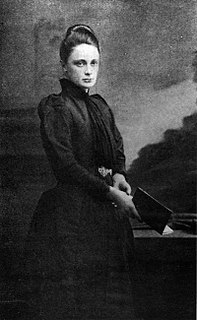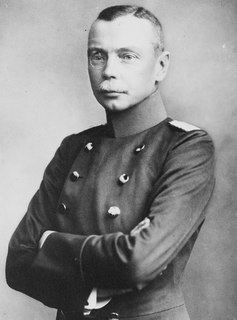A Quote by Albert Pike
Doubt, the essential preliminary of all improvement and discovery, must accompany the stages of man's onward progress. The faculty of doubting and questioning, without which those of comparison and judgment would be useless, is itself a divine prerogative of the reason.
Related Quotes
It seems to us that in intelligence there is a fundamental faculty, the alteration or the lack of which, is of the utmost importance for practical life. This faculty is judgment, otherwise called good sense, practical sense, initiative, the faculty of adapting one's self to circumstances. A person may be a moron or an imbecile if he is lacking in judgment; but with good judgment he can never be either. Indeed the rest of the intellectual faculties seem of little importance in comparison with judgment.
Do you call it doubting to write down on a piece of paper that you doubt? If so, doubt has nothing to do with any serious business. But do not make believe; if pedantry has not eaten all the reality out of you, recognize, as you must, that there is much that you do not doubt, in the least. Now that which you do not at all doubt, you must and do regard as infallible, absolute truth.
The claim is also sometimes made that science is as arbitrary or irrational as all other claims to knowledge, or that reason itself is an illusion. As Ethan Allen said Those who invalidate reason ought seriously to consider whether they argue against reason with or without reason; if with reason, then they establish the principle that they are labouring to dethrone. If they argue without reason, which they must do, in order to be consistent with themselves, they are out of reach of rational conviction, nor do they deserve a rational argument.
I would call the attention of the reader to the difference between "reason" and "reasoning." Reason is a light, reasoning a process. Reason is a faculty, reasoning an exercise of that faculty. Reasoning proceeds from one truth to another by means of argumentation. This generally involves the whole mind in labor and complexity. But reason does not exist merely in order to engage in reasoning. The process is a means to an end. The true fulfillment of reason as a faculty is found when it can embrace the truth simply and without labor in the light of single intuition.
The conflict between the principle of liberty and the fact of slavery is coming gradually to an issue. Slavery has now the power, and falls into convulsions at the approach of freedom. That the fall of slavery is predetermined in the counsels of Omnipotence I cannot doubt; it is a part of the great moral improvement in the condition of man, attested by all the records of history. But the conflict will be terrible, and the progress of improvement perhaps retrograde before its final progress to consummation.
The essential thing is action. Action has three stages: the decision born of thought, the order or preparation for execution, and the execution itself. All three stages are governed by the will. The will is rooted in character, and for the man of action character is of more critical importance than intellect. Intellect without will is worthless, will without intellect is dangerous.
What else is it that should trace the insuperable line? Is it the faculty of reason or perhaps the faculty of discourse? But a full-grown horse or dog is beyond comparison a more rational, as well as more conversable animal, than an infant of a day or a week or even a month old. But suppose they were otherwise, what would it avail? The question is not, Can they reason?, nor Can they talk? but, Can they suffer? Why should the law refuse its protection to any sensitive being? The time will come when humanity will extend its mantle over everything which breathes.
The men of wealth who today are trying to prevent the regulation and control of their business in the interest of the public by the proper government authorities will not succeed, in my judgment, in checking the progress of the movement. But if they did succeed they would find that they had sown the wind and would surely reap the whirlwind, for they would ultimately provoke the violent excesses which accompany a reform coming by convulsion instead of by steady and natural growth.




































